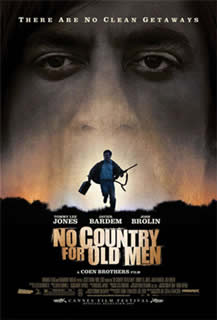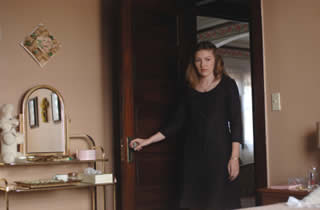My particular interest in “No Country for Old Menâ€, the new Coen Brothers’ film, lies in the invisibility of the female characters throughout the film, which leaves the adventure solely to the men. While I can’t say this film was bad, conversely being one of the best films I have seen in a while, its characters nonetheless seemed rather skewed within the masculine/feminine spectrum.
This skew is one of the factors that lead us to placing it among the Westerns like any classic John Ford film or the more recent Eastwood films. Consider the Western genre, and one of its stereotypical plots: a solitary man sets out to save the day, six-shooter in hand, kills all of the bad guys, and then returns home to a wife with open arms and a warm meal ready for them on the table. Presumably the ultimate male fantasy: Reaffirming masculinity through dominating other men and then utilizing the women as servants. A woman’s role in the Western film was as a comfort, an invisible element that the men desired and returned to, only to abandon once again for more adventure.
“No Country for Old Menâ€, like other Westerns, depicts the women in the film as a symbol of domesticity, but for the most part denies these women an existence and importance in the diegetic world of the film.
for the most part denies these women an existence and importance in the diegetic world of the film.
The two female characters that have a connection to this story are Carla Jean (played by Kelly MacDonald), and Loretta Bell (played by Tess Harper), both playing wives of the main characters. Even then, their actions and words seem to go ignored by their husbands and in the end affect little change in the outcome of events.
Carla Jean’s role is clearly set as the domesticated wife. She is seen mainly inside her trailer home, except for when the safety of the home is threatened, when she is ordered to go to her mother’s house. Having very little choice in her own fate, she relies on her husband (Llewelyn, played by Josh Brolin) to make the right decision for her, and though she initially resists, her husband brushes it off and once again commands that she does what he says.
There are also a few brief moments where Carla Jean is out of the house, when her husband is away. This action in particular goes against the ‘rules’ set upon the male-dominated female. And because of her disobedience, Carla Jean is punished with both paranoia and eventually guilt (from causing more problems for her husband).
In her meeting with the sheriff (played by Tommy Lee Jones), Carla Jean speaks in a hushed tone, trying to hide the fact that she is out in public with ‘another man’, as embarrassment and paranoia sets in: an emotional display of a restraint she believes is placed upon her by her absent husband.
Her vulnerability especially shows through when one of the ‘bad guys’ in the film spots Carla Jean and her mother by the bus station and uses them to find her husband. Again, more evidence that makes Carla Jean appear as a danger to those around her when she is away from the domestic setting. In this case, her absence from her ‘rightful place’ (the home) is punished by the danger she puts her husband in.  This also presents the idea that Carla Jean’s responsibility wasn’t just to stay in the home, but if commanded to leave her ‘place’, even by her husband, it was her ‘duty’ to fight to stay in that place. Look at one of the final scenes in the film (and the last one she is included in). Back in her ‘rightful place’, she sits passively in a bedroom as she becomes a permanent part of the domestic setting, in the figurative sense, lacking any further action in the film.
This also presents the idea that Carla Jean’s responsibility wasn’t just to stay in the home, but if commanded to leave her ‘place’, even by her husband, it was her ‘duty’ to fight to stay in that place. Look at one of the final scenes in the film (and the last one she is included in). Back in her ‘rightful place’, she sits passively in a bedroom as she becomes a permanent part of the domestic setting, in the figurative sense, lacking any further action in the film.
While the female characters seem to live in the background of this film, appearing every so often to help nudge the story along or add a contrast to the gruesome events, they offer very little to the events themselves. Rather it is the male characters alone that produce the action of the story, immersing themselves deep into this tale of murder and survival.
Llewelyn first appears out on a hunt and stumbles across a scene of murder. He eventually finds a bag full of two-million dollars. He takes the money from the murder scene, thus solidifying his fate to being pursued by a madman for the rest of the film. What could be more of a Western theme than good versus evil, both solitary men in an otherwise deserted area of the country, the hunter and the hunted? In a sense, he creates an adventure for himself, one with danger and violence, something he perhaps lacked, but nonetheless needed on a primal level to feel fulfilled.
two-million dollars. He takes the money from the murder scene, thus solidifying his fate to being pursued by a madman for the rest of the film. What could be more of a Western theme than good versus evil, both solitary men in an otherwise deserted area of the country, the hunter and the hunted? In a sense, he creates an adventure for himself, one with danger and violence, something he perhaps lacked, but nonetheless needed on a primal level to feel fulfilled.
Through his adventure, Llewelyn is required to prove himself against the madman pursuing him as he attempts to outwit and outrun the murderer. It is purely a display of physical and intellectual muscle being  flexed, the idea of “I am stronger, I am faster, I am more clever†than my enemy. Thus, Llewelyn is able to prove his masculinity by taking on this adventure.
flexed, the idea of “I am stronger, I am faster, I am more clever†than my enemy. Thus, Llewelyn is able to prove his masculinity by taking on this adventure.
Getting back to the idea I raised in my first article, when I posed the question of: “Does society dictate art, or does art dictate society?†The Coens, as any other great filmmaker, know the power in their words. Granted they are bound, to an extent, by the original material (based on a novel by Cormac McCarthy), but nonetheless it is very reasonable to create a stronger or more present female role in the wife, and a more rounded male character in the husband.
This polarized presentation of the genders only helps to resurrect the old (and dying) notion of woman as enslaved by the home and man as being solely granted the freedom of adventure. It is a shame that the filmmakers who presented one of the most powerful female characters in cinematic history (Margie in “Fargoâ€), also presented one of the most skewed and invisible female characters in recent years through their portrayal of Carla Jean.
Undoubtedly, the Coens were fully aware of Carla Jean’s invisibility in the film. Therefore, I can only hope it is the Western genre itself that is holding these great filmmakers to such an extreme view of women, as this genre unfortunately has always favored the traditional over the progressive ideology.
Trending
- Shahab Hosseini in Pietro Malegori’s Shukran
- Karlovy Vary Film Festival winners
- Future of diversity, discussed at Karlovy Vary
- Palestine Islands wins 2024 Bridging the Borders Award at Palm Springs Shortfest
- Shadow of the Cypress from Iran wins at 2024 Tribeca
- The Count of Monte Cristo, review
- Bridging the Borders Award Jury and Nominees, 2024 Palm Springs Shortfest
- You Burn Me, review

